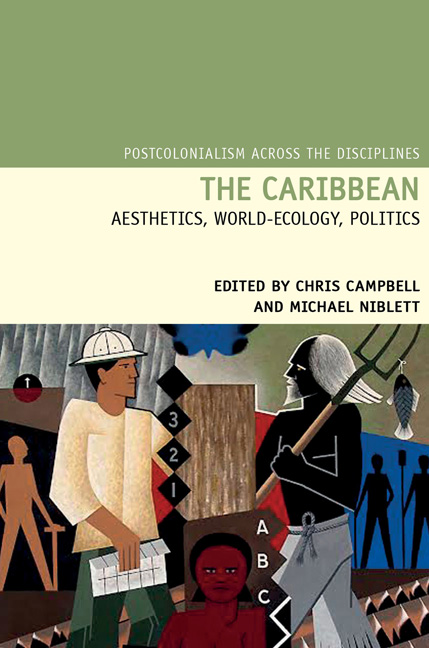Book contents
- Frontmatter
- Contents
- Acknowledgements
- Introduction: Critical Environments: World-Ecology, World Literature, and the Caribbean
- Prologue: The Brutalization of Truth
- Catastrophes and Commodity Frontiers
- Ecological Revolutions and the Nature of Knowledge
- 4 ‘The Abstract Globe in One's Head’: Robert Schomburgk, Wilson Harris, and the Ecology of Modernism
- 5 Mining and Mastery: Ethnography and World-Ecology in the Work of Charles Barrington Brown
- 6 Hegemony in Guyana: REDD-plus and State Control over Indigenous Peoples and Resources
- Economies of Extraction: Restructuring and Resistance
- Epilogue: Tingaling
- Notes on Contributors
- Index
6 - Hegemony in Guyana: REDD-plus and State Control over Indigenous Peoples and Resources
from Ecological Revolutions and the Nature of Knowledge
- Frontmatter
- Contents
- Acknowledgements
- Introduction: Critical Environments: World-Ecology, World Literature, and the Caribbean
- Prologue: The Brutalization of Truth
- Catastrophes and Commodity Frontiers
- Ecological Revolutions and the Nature of Knowledge
- 4 ‘The Abstract Globe in One's Head’: Robert Schomburgk, Wilson Harris, and the Ecology of Modernism
- 5 Mining and Mastery: Ethnography and World-Ecology in the Work of Charles Barrington Brown
- 6 Hegemony in Guyana: REDD-plus and State Control over Indigenous Peoples and Resources
- Economies of Extraction: Restructuring and Resistance
- Epilogue: Tingaling
- Notes on Contributors
- Index
Summary
Introduction: A Brief Political History of Guyana and Democratic Centralism
About 90 per cent of Guyana's population of 770,000 live on the coastal plain (9 per cent of the land mass), which was empoldered from swamps for sugar cane and other tropical crops by African slave labour during the Dutch colonial period in the seventeenth and eighteenth centuries. After the abolition of slavery in 1833, the sugar plantation owners secured replacement labour from indentured Indians from the subcontinent. The indigenous Amerindians, no longer needed as a militia to deter and recapture escaped slaves, withdrew from the coast into the hinterland. Amerindians were viewed in much of the nineteenth and early twentieth centuries as nations doomed to either outright extinction by European diseases or, at best, to assimilation and cultural obliteration as distinct peoples (Bulkan and Bulkan, 2006). A system of reservations was put in place under the Aboriginal Indians Protection Ordinance (AIPO) of 1902. Neither the revised AIPO of 1910, nor its successive replacements (the 1951, 1976, and currently the 2006 Amerindian Act) acknowledged the pre-existing native title of Amerindians to their lands. In contrast, Guyana's Independence Agreement from Britain required the independent Government to provide legal ownership or rights of occupancy for Amerindians over ‘areas and reservations or parts thereof where any tribe or community of Amerindians is now ordinarily resident or settled and other legal rights, such as rights of passage, in respect of any other lands they now by tradition or custom de facto enjoy freedoms and permissions corresponding to rights of that nature. In this context, it is intended that legal ownership shall comprise all rights normally attaching to such ownership’. By 2012, 96 of the estimated 160 Amerindian communities had been awarded communal tenure under the ex gratia terms of the Amerindian Act, covering about 3.1 million hectares (Mha) or 14 per cent of Guyana (Guyana Forestry Commission, and Indufor, 2013, 13).
Late colonial, and post-independence politics since 1966, have been typified by a struggle between African Guyanese and East Indian Guyanese. Consequent on waves of emigration to Canada and the USA, currently half the citizens of Guyana live outside the country, mostly for economic reasons.
- Type
- Chapter
- Information
- The CaribbeanAesthetics, World-Ecology, Politics, pp. 118 - 142Publisher: Liverpool University PressPrint publication year: 2016



